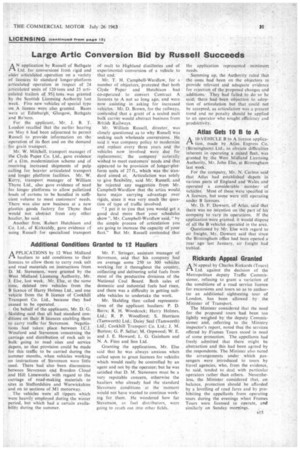Large Artic Conversion Bid by Russell Succeeds
Page 33

If you've noticed an error in this article please click here to report it so we can fix it.
AN application by Russell of Bathgate Ltd. for conversions from rigid and older articulated operation on a variety of licences to standard longer-platform articulated operation in respect of 24 articulated units of 120 tons and 25 articulated trailers of 95itons was. granted by the Scottish Licensing Authority last week. Five new vehicles of special type on A licence were also granted. Bases were at Edinburgh, Glasgow, Bathgate and Bo'ness.
For the applicant, Mr. J. B. T. Loudon recalled that the earlier hearing on May 6 had been adjourned to permit Russell to provide information on the operation of its fleet and on the demand for grain transport.
Mr. W. Mitchell, transport manager of the Clyde Paper Co. Ltd., gave evidence of a ilm. modernization scheme and of receiving increased shipments of pulp calling for heavier articulated transport and longer platform facilities. Mr. W. Kerry, transport manager of William Thyne Ltd., also gave evidence of need for longer platforms to allow palletized loads of cartons to be handled in sufficient volume to meet customers' needs. There was also new business at a new plastics goods factory for Thyne that would not abstract from any other haulier, he said.
Another firm, Robert Hutchison and Co. Ltd., of Kirkcaldy, gave evidence a using Russell for specialized transport of malt to Highland distilleries and of experimental conversion of a vehicle to that end.
Mr. T. H. Campbell-Wardlaw, for a number of objectors, protested that both Clyde Paper and Hutchison had co-operated to convert Contract A licences to A not so long ago, and were now assisting in asking for increased vehicles. Mr. D. Brown, for the railways, contended that a grant of a sealed malt bulk carrier would abstract business from British Railways.
Mr, William Russell, director, was closely questioned as to why Russell was seeking such wholesale conversions. He said it was company policy to modernize and replace every three years and the vehicles now involved were due for replacement; the company naturally wished to meet customers' needs and that appeared to be provision of longer-platform units of 27 ft., which was the standard aimed at. Articulation was solely to give flexibility, said Mr. Russell, and he rejected any suggestion from Mr. Campbell-Wardlaw that the artics would have major carrying advantage over rigids, since it was very much the question of type of traffic involved.
"I put it to you that you would get a good deal more than your schedules show ", Mr. Campbell-Wardlaw said, " by the simple process of articulation you are going to increase the capacity of your fleet." But Mr. Russell contended that the application represented minimum needs.
• Summing up, the Authority ruled that the onus had been on the objectors to provide relevant and adequate evidence for rejection of the proposed changes and additions. They had failed to do so he said; there had been objection to adoption of articulation but that could not be accepted, as articulation was a present trend and no penalty should be applied to an operator who sought efficiency and productivity.




































































































